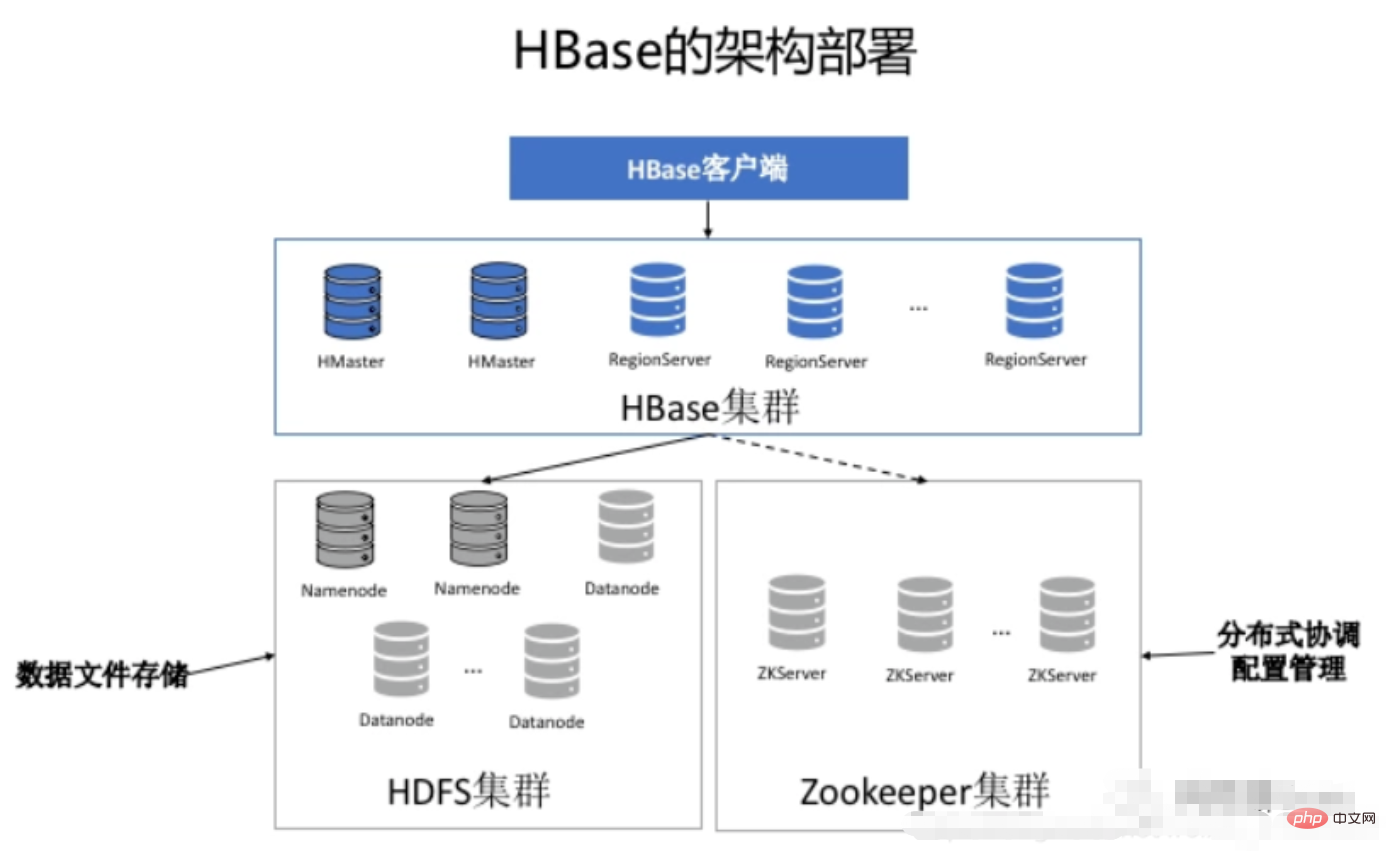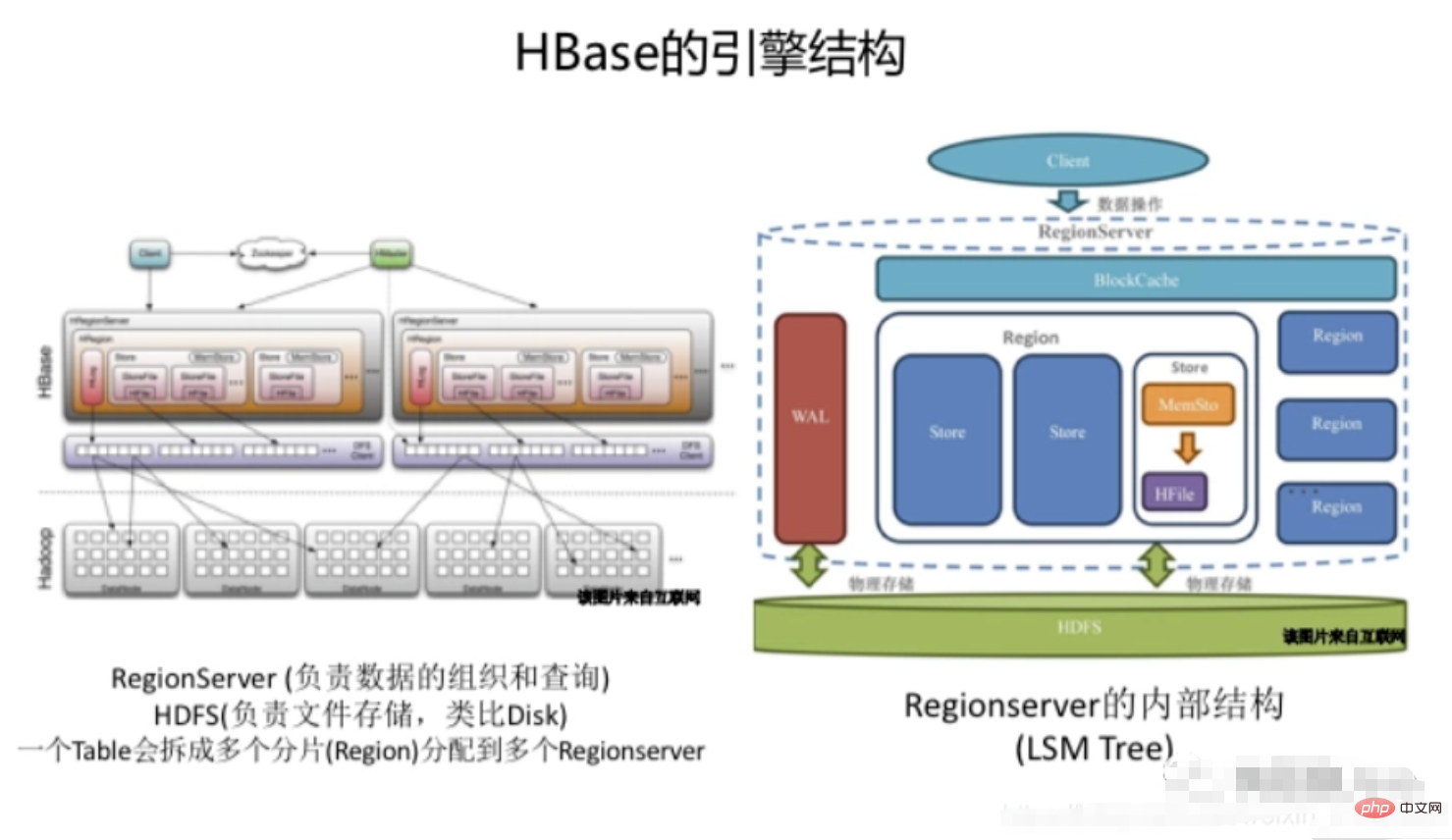What is the difference between hbase and mysql
Difference: 1. MySQL is a row storage mode, and hbase is a column storage mode; 2. The bottom layer of MySQL is binlog, and the bottom layer of hbase is hdfs; 3. MySQL is mainly used to store business data, and the data storage capacity is relatively large. Small, while HBase is mainly used to store massive business data and log data, and the data storage capacity is large.

The operating environment of this tutorial: windows7 system, mysql8 version, Dell G3 computer.
MySQL HBase is two databases commonly used in our daily applications, which respectively solve the online transaction problems of applications and the massive storage problems of big data scenarios.
Comprehensive comparison
MySQL: It is a commonly used database, using row storage mode, the bottom layer is binlog, used to store business data, data storage The amount is smaller.
HBase: Column database, the bottom layer is HDFS, which can store massive amounts of data. It is mainly used to store massive business data and log data.
Look at the differences from an architectural comparison
Compared with MySQL, HBase’s architectural features:
1. Completely distributed ( Data fragmentation, fault self-recovery)
2. The bottom layer uses HDFS (storage and calculation separation).
Capability differences seen from the architecture:
1. MySQL: Simple operation and maintenance (fewer components), low latency (short access path)
2.HBase: Good scalability, built-in fault-tolerant recovery and data redundancy


##Differences from the engine structure
Compared with MySQL, HBase’s internal engine features: 1. HBase has no native SQL engine (cannot use SQL to access, use API), cloud HBase enhanced version (Lindorm) and open source Phoenix provides sQL capabilities2.HBase uses LSM (Log-Structure Merge) tree, and Innodb uses B-tree. Capability differences seen from the engine structure (B Tree vs LSM Tree):1.MySQL: read and write balance, space fragmentation2. HBase: focus Easy to write, compact storage without waste, Io amplification, strong data import capability

##Data access Similarities: The data is logically organized in a table model, and the application is used to add, delete, modify, and query the data.
Differences: MySQL has richer SQL functions: stronger transaction capabilities , HBase can use APIl for more flexible and better-performing access, or use Phoenix to use standard SQL access; only supports single-row transactions
[Related recommendations:
mysql video tutorialThe above is the detailed content of What is the difference between hbase and mysql. For more information, please follow other related articles on the PHP Chinese website!

Hot AI Tools

Undresser.AI Undress
AI-powered app for creating realistic nude photos

AI Clothes Remover
Online AI tool for removing clothes from photos.

Undress AI Tool
Undress images for free

Clothoff.io
AI clothes remover

Video Face Swap
Swap faces in any video effortlessly with our completely free AI face swap tool!

Hot Article

Hot Tools

Notepad++7.3.1
Easy-to-use and free code editor

SublimeText3 Chinese version
Chinese version, very easy to use

Zend Studio 13.0.1
Powerful PHP integrated development environment

Dreamweaver CS6
Visual web development tools

SublimeText3 Mac version
God-level code editing software (SublimeText3)

Hot Topics
 MySQL's Role: Databases in Web Applications
Apr 17, 2025 am 12:23 AM
MySQL's Role: Databases in Web Applications
Apr 17, 2025 am 12:23 AM
The main role of MySQL in web applications is to store and manage data. 1.MySQL efficiently processes user information, product catalogs, transaction records and other data. 2. Through SQL query, developers can extract information from the database to generate dynamic content. 3.MySQL works based on the client-server model to ensure acceptable query speed.
 How to start mysql by docker
Apr 15, 2025 pm 12:09 PM
How to start mysql by docker
Apr 15, 2025 pm 12:09 PM
The process of starting MySQL in Docker consists of the following steps: Pull the MySQL image to create and start the container, set the root user password, and map the port verification connection Create the database and the user grants all permissions to the database
 Laravel Introduction Example
Apr 18, 2025 pm 12:45 PM
Laravel Introduction Example
Apr 18, 2025 pm 12:45 PM
Laravel is a PHP framework for easy building of web applications. It provides a range of powerful features including: Installation: Install the Laravel CLI globally with Composer and create applications in the project directory. Routing: Define the relationship between the URL and the handler in routes/web.php. View: Create a view in resources/views to render the application's interface. Database Integration: Provides out-of-the-box integration with databases such as MySQL and uses migration to create and modify tables. Model and Controller: The model represents the database entity and the controller processes HTTP requests.
 Solve database connection problem: a practical case of using minii/db library
Apr 18, 2025 am 07:09 AM
Solve database connection problem: a practical case of using minii/db library
Apr 18, 2025 am 07:09 AM
I encountered a tricky problem when developing a small application: the need to quickly integrate a lightweight database operation library. After trying multiple libraries, I found that they either have too much functionality or are not very compatible. Eventually, I found minii/db, a simplified version based on Yii2 that solved my problem perfectly.
 How to install mysql in centos7
Apr 14, 2025 pm 08:30 PM
How to install mysql in centos7
Apr 14, 2025 pm 08:30 PM
The key to installing MySQL elegantly is to add the official MySQL repository. The specific steps are as follows: Download the MySQL official GPG key to prevent phishing attacks. Add MySQL repository file: rpm -Uvh https://dev.mysql.com/get/mysql80-community-release-el7-3.noarch.rpm Update yum repository cache: yum update installation MySQL: yum install mysql-server startup MySQL service: systemctl start mysqld set up booting
 Centos install mysql
Apr 14, 2025 pm 08:09 PM
Centos install mysql
Apr 14, 2025 pm 08:09 PM
Installing MySQL on CentOS involves the following steps: Adding the appropriate MySQL yum source. Execute the yum install mysql-server command to install the MySQL server. Use the mysql_secure_installation command to make security settings, such as setting the root user password. Customize the MySQL configuration file as needed. Tune MySQL parameters and optimize databases for performance.
 Laravel framework installation method
Apr 18, 2025 pm 12:54 PM
Laravel framework installation method
Apr 18, 2025 pm 12:54 PM
Article summary: This article provides detailed step-by-step instructions to guide readers on how to easily install the Laravel framework. Laravel is a powerful PHP framework that speeds up the development process of web applications. This tutorial covers the installation process from system requirements to configuring databases and setting up routing. By following these steps, readers can quickly and efficiently lay a solid foundation for their Laravel project.
 MySQL and phpMyAdmin: Core Features and Functions
Apr 22, 2025 am 12:12 AM
MySQL and phpMyAdmin: Core Features and Functions
Apr 22, 2025 am 12:12 AM
MySQL and phpMyAdmin are powerful database management tools. 1) MySQL is used to create databases and tables, and to execute DML and SQL queries. 2) phpMyAdmin provides an intuitive interface for database management, table structure management, data operations and user permission management.






